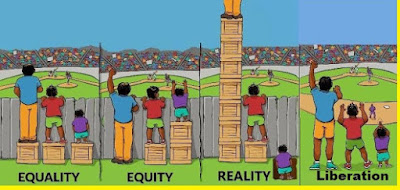Our Office of Inclusion and Diversity has provided us the great opportunity to participate in a series of workshops focusing on awareness around race equity (and lack thereof) and strategies for ourselves, our courses, and our academic culture to become (more) equitable. Part of this series is that we are going to implement projects in our disciplines or programs to improve equity across campus.
The workshop series is conducted out of the University of South California's Center for Equity, and it has been a great experience so far. I am not going to retrace all of the steps and discussions we are having; instead, I will highlight some of the points that took me by surprise.
Maybe you saw this article in the Chronicle of Higher Education a while back and thought to yourself, this is not happening in my classes or, this is happening in my classes but I don't know how to improve the situation.
https://www.chronicle.com/article/Traditional-Teaching-May/243339?cid=at&utm_source=at&utm_medium=en&elqTrackId=d9bc9e4ee59f4eea9168c9f5d77010ed&elq=e3b3c595e6bb4e5793fcf596213a6ee8&elqaid=18996&elqat=1&elqCampaignId=8587
So here are some very simple ideas to get you on this track of thinking more inclusively with more equity in mind:
1. When you use examples, case studies, and other assignments for your class, use non-Anglophone names. It helps if you use names of people you have met so that you can say to your students you indeed know someone with that name (because you may get push-back using names not familiar to your students. This strategy broadens what kinds of names are possible to use in a classroom.
2. When you put together readings for your course, choose texts from non-canonical authors that introduce the idea that not all scientists, philosophers, engineers are white men - I am exaggerating, though I suspect you recognize the problem. Including these voices shows all of your students that anyone can be successful in your particular field.
3. You may say that you are only using a text book and thus do not have this option of bringing diverse voices into your course. Think about how you can connect your area of teaching then to issues of equity. It may be worth it to give a brief history of your subject that includes references of scientists who are not often discussed. Keep an eye out for news items connected to your subject that can highlight inequity or equitable use of your subject.
4. Give your students a voice. In an active learning space, you have already done this - take it a step further and consider creating spaces where students can briefly reflect on what is happening in their world, whether that is announcing a campus event (building community) or discussing a news topic that impacts them.
5. Include a statement in your syllabus about equity.
Because this should be our goal:
More to come!
